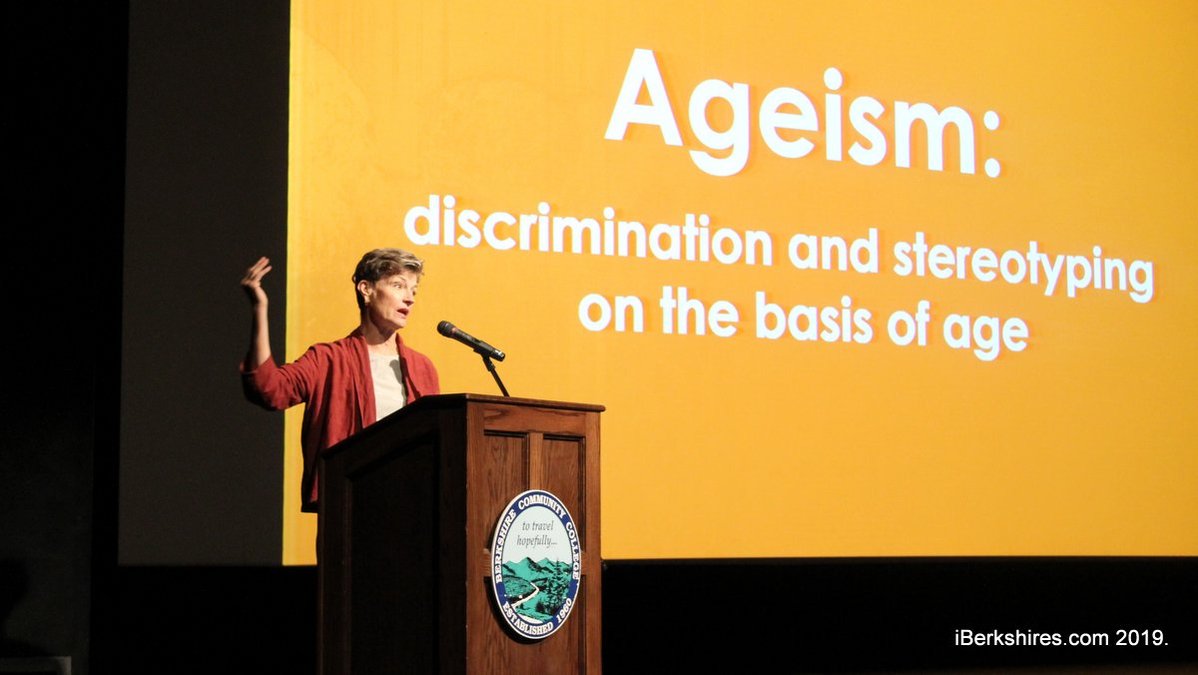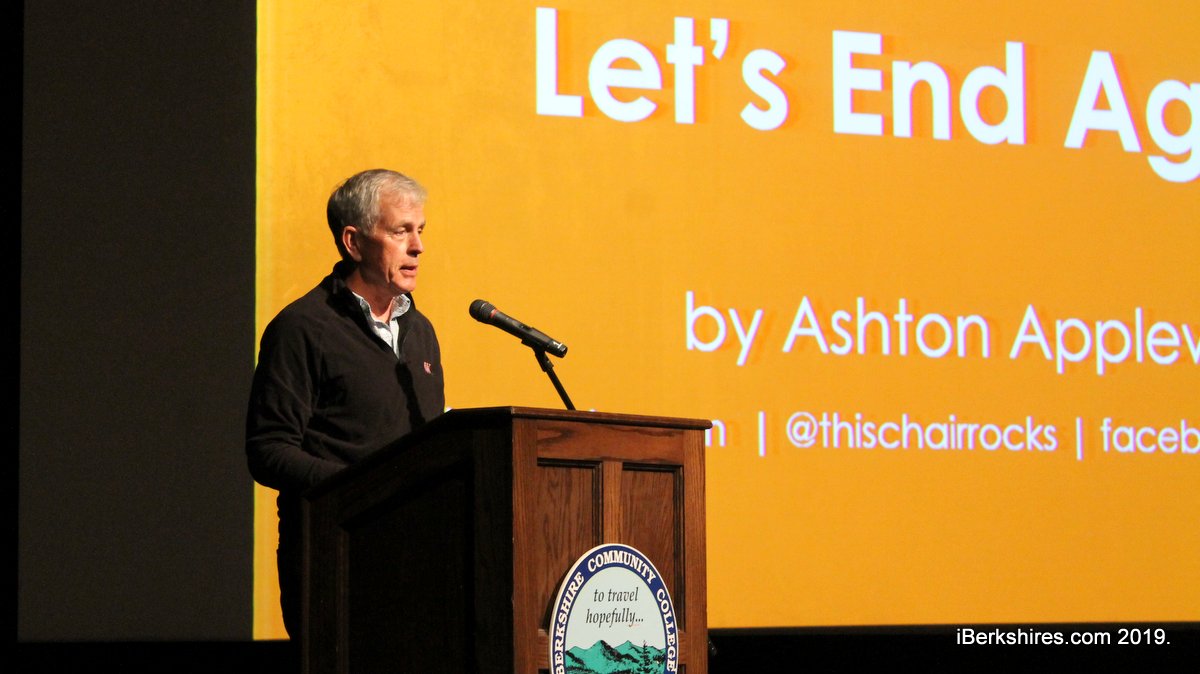OLLI Forum Delves Into Issue of AgeismBy: Andy McKeever, iBerkshires Staff
01:12AM / Friday, August 16, 2019 | |
 Ashton Applewhite provides the keynote address on ageism to start off a daylong conference on the topic at BCC. Ashton Applewhite provides the keynote address on ageism to start off a daylong conference on the topic at BCC. |

OLLI instructor Tom Hodgson called this generation 'pioneers' because people are living longer and better than any time in human history.
PITTSFIELD, Mass. — At one point, Ashton Applewhite's biggest fear was that she'd end up "drooling in an institution" when she got old.
She was worried about memory loss. She didn't want to live a depressed life. Getting old was not something she wanted to even think about. But something changed when she embarked on a project writing about people over the age of 80 and still working.
"I realized that getting older was almost certainly going to be different and probably a lot better than the grim slide into depression, diapers, and puffy white shoes," Applewhite said.
She researched the data -- only 2.5 percent of Americans over the age of 65 were in nursing homes, which is down from a previous 4 percent and increases to just 9 percent for people over the age of 85. The likelihood she'd end up in an "institution" is much more remote than what most believe about aging. Eight out of nine of seniors have not experienced dementia -- the likelihood of memory loss is actually much less than she had known.
"The total number of cases of Alzheimer's is rising because there are more older people in the population and aging is the greatest risk," she said. "The odds of any one of us in this room being diagnosed with Alzheimer's are getting lower and lower, and people are being diagnosed at older ages. The real epidemic is anxiety over memory loss."
Cognitive studies reveal what is called a "U-shape" of happiness in which people tend to be happier at the very beginning and end of their lives -- so the pessimistic image of a depressed old woman that Applewhite could become, that's not really likely either.
So why was Applewhite so scared about aging? Why did she have this image in her head? Why did she worry whether or not she was aging well?
"I started obsessing about why so few people know the statistics, they are readily available, they're right at the tippy top of the internet," she said.
"And the reason is ageism, judging a person or group of people based on how old we think they are. And we experience ageism, anytime someone thinks that we are too old for something instead of finding out who we are, what we're interested in and what we're capable of."
She has now written a book about fighting against a culture that has pitted young versus old, sowed the message that old age is ugly, instilled the belief that twentysomethings are at the peak of life and it is all downhill from there, and that's perpetuated the notion that the older you get, the meeker you become.
"Prejudice is not about how we look. It's about how people in power assign meaning to how we look. Stereotyping is the basis of all prejudice, the assumption that all members of the group are alike, which is always wrong and misinformed, of course, but especially when it comes to age, because the longer we live, the more different from one another will become, as decades of unique experiences shape us," she said.
"And yet, we tend to think of everyone in a retirement home at the same age, that would be 'old,' when they can spam for decades."
On Thursday, she took that message to Berkshire Community College as the keynote speaker of the Osher Lifelong Learning Institute's daylong "university" on changing the culture of aging. Panels were held throughout the day to discuss how to make the community more welcoming to people of all ages.
"This is a one-day conference on growing older and the changes and opportunities," said OLLI Executive Director Meghan Whilden, adding that it was entirely organized by older volunteers.
Applewhite kicked off the event with somewhat of a call to action for people to follow her lead in challenging ageism.
She stopped making jokes about having "senior moments" because she remembers losing her car keys when she was in high school and nobody ever called that a "junior moment." She stopped blaming old age for her knee problem because the other knee is just as old and is perfectly fine. When she looks in the mirror and sees a wrinkle, she doesn't rush to cover it up but rather thinks about the experiences she's had to get to that point. And it started to bother her when somebody would say "you look good for your age," as if that was a compliment.
She said people should be worried about going to an event and "making a beeline" to people their own age, but be able to be friends with people of all ages. They shouldn't worry about whether or not a haircut is "age-appropriate."
She is now seeing ageism everywhere. In debates about health care, someone would inevitably suggest why spending money on older people who are going to die soon and instead focus on children. She said it isn't ethical nor legal to do that to any other group why would that be fine for "old people." She sees the cosmetic industry marketing "anti-aging" products.
She said numerous job sites urge older workers to leave early accomplishments off to conceal their age. She said older engineers in California are often getting Botox before interviews to conceal their age. She said the average worker at Google is 29 years old.
"Experience is an asset, not a liability. And it's kind of nutty to have to even say that out loud. Not one negative stereotype about older workers is true. We know that diverse workplaces work better, and are better places to work and are more profitable for reasons that are intuitively obvious," she said. "You can bring more knowledge to the table and suit a broader customer base."
She compared the issue to sexism. It isn't that being a woman makes life harder, it is sexism, she said. It isn't a man loving another man that makes life harder for gay men, it is homophobia, she said. And the concept is similar to aging.
"The passage of time that makes getting older is so much harder than it should be. It is ageism when labels are hard to read, where there's no handrail ... or we can't open the damn jar. We blame ourselves," she said. "Our failure to age successfully, instead of blaming the ageism, that makes these barriers acceptable. And these natural transitions shameful."
She said the mentality that "old people" are one homogeneous group makes it easier for people to lose care for one's well-being because they are different.
It is rooted in shame and anxiety. That fear of the stereotypical vision of an "old person" causes anxiety for people throughout the nation and ultimately become a contribution to one's own destiny. They spend so much time trying to deny that they are getting older because culturally they've been wired to believe that was a bad thing.
She believes people become delusional and can deny their own aging as long as they can still do the things they used to do -- still running upstairs, still thriving at night. But in reality, everyone is always aging, all the time. Applewhite says it is time to embrace that and simply doing that already improves one's life and mentality as they get older.
"Unless we challenge the underlying message that to age is to lose value as a human being, it's that basic and ugly in my mind, it becomes part of our identity. That is internalized ageism," she said.
She said studies have shown that people who confront that mindset and embrace getting older live longer and happier.
"People with more positive feelings, which really means more accurate feelings, right? It means they have cleared away this sort of windshield, and this is a very dirty windshield with all the ages messages we're barrage with, when you see more clearly what aging actually involves people with who have those accurate feelings walk faster, heal quicker, live longer, a whopping seven and a half years longer on average," she said.
Applewhite's call to action is for people to fight back against that stereotype and help create an age-friendly community because it will benefit everybody now and in the future. She said go make friends from a different age and don't be scared off from going to a social event. If one needs help, ask for it and not be ashamed because nearly everybody enjoys helping people but nobody likes to ask for help.
There is urgency too. She said people are living longer, so that segment known as "old" which can span four generations will continue to grow, and now is the time to shape a "multi-generational society."
"This gives us a critical window of opportunity to shape a world that supports people of all ages. So how do we get there? Tap into what we know: Growing older isn't just different from what we've been brainwashed to believe, it is way better. It's not that the losses aren't real. It's that we only have one side of the story," Applewhite said.
She wants to challenge the system that treats older people as second-class citizens and the idea that feeling old means feeling useless.
| 
